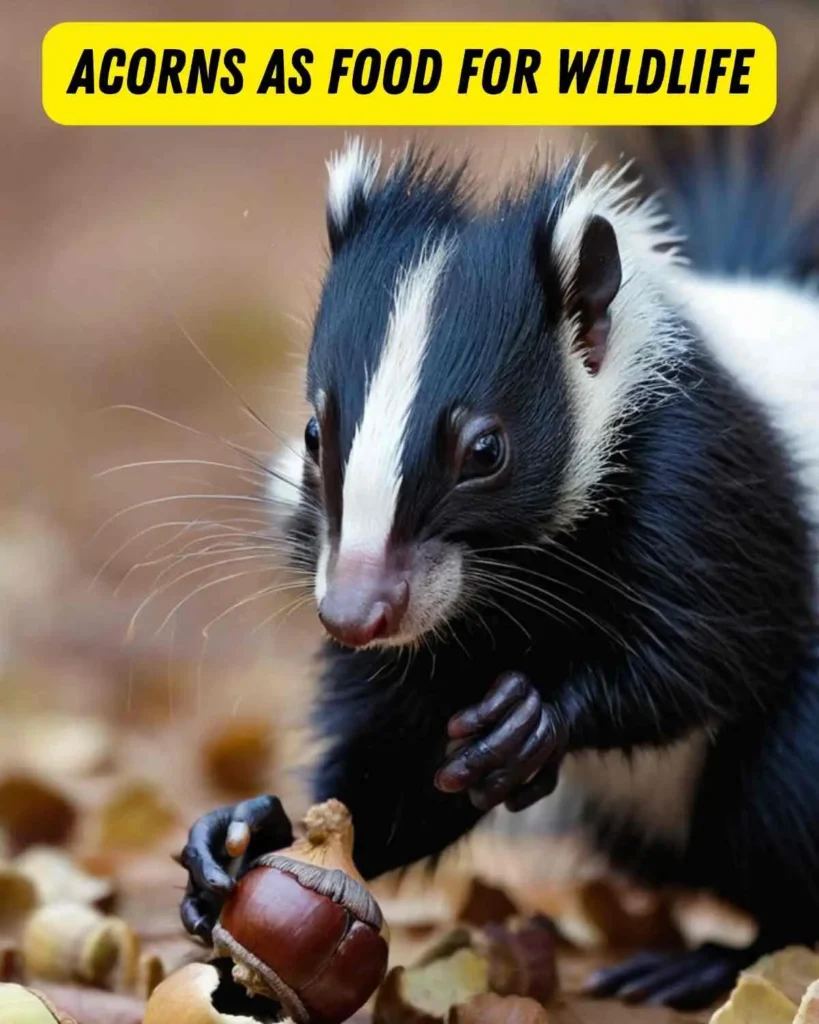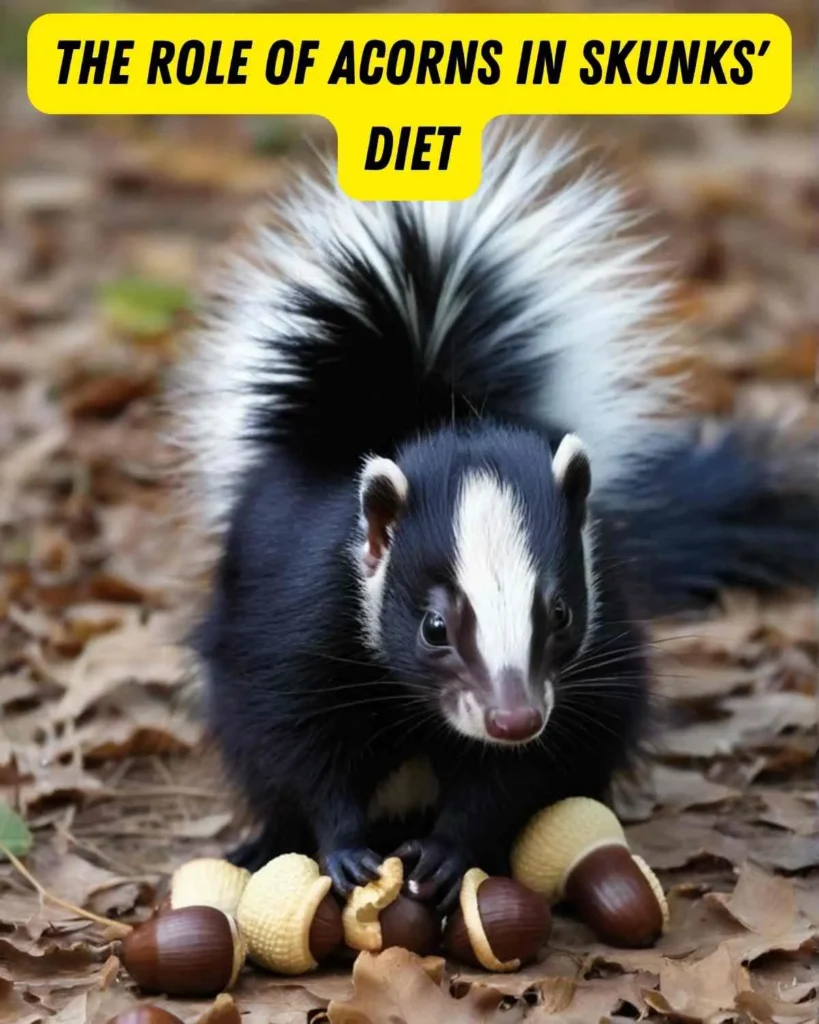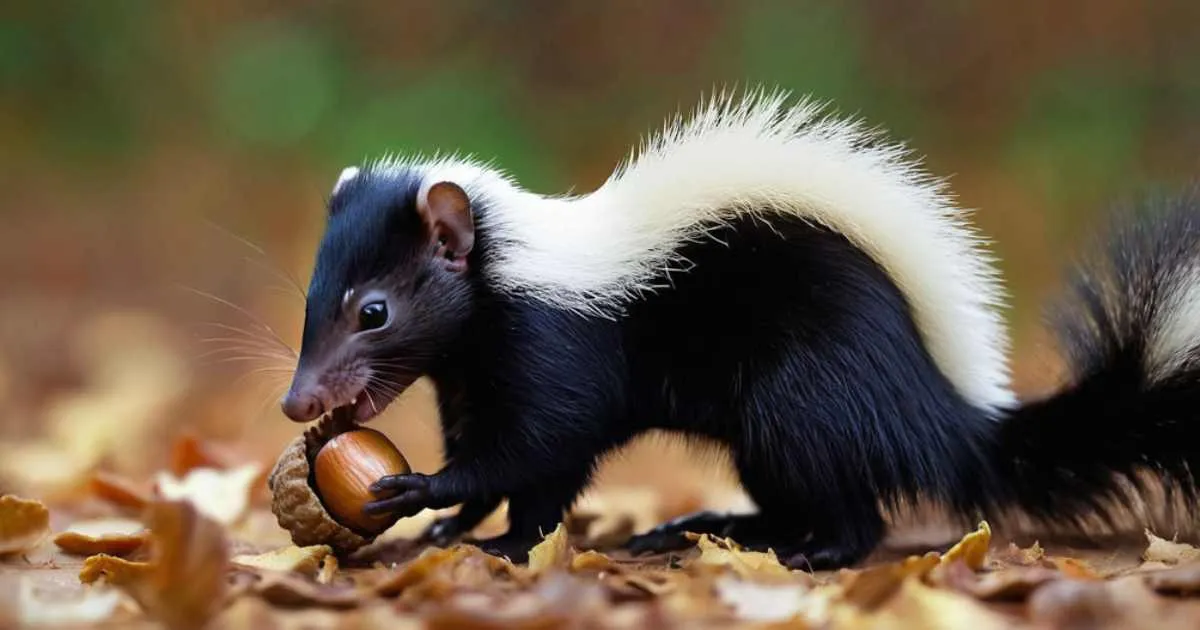Can Skunks Eat Acorns? Surprising Dietary Facts
Last updated on August 11th, 2024 at 07:33 am
From my experience as a skunk pet owner and wildlife observer, I’ve learned that skunks have quite an appetite for acorns! These little foragers rely on acorns and other nuts to bulk up for winter. If you’re interested in understanding the seasonal eating habits of skunks and how they impact their environment, stick around to learn more about these resourceful animals.
The Skunk’s Diet
Imagine a skunk rummaging through the forest. What do they find to eat? Skunks are not picky eaters. They eat many different foods. One question many people ask is, do skunks eat acorns? Let’s look into the skunk’s diet to find out.
Omnivorous Nature
Skunks have a diverse diet. They are omnivores. This means they eat both plants and animals. Their choice of food changes with the seasons. It also depends on what is available in their habitat.
Typical Food Sources
Skunks search for food at night. They use their strong sense of smell. They find food on the ground and in low bushes. Here is a list of typical food sources for skunks:
- Insects – beetles, crickets, and larvae
- Small rodents – mice and voles
- Eggs – Bird and reptile eggs
- Fruit and berries – Seasonal treats
- Vegetation – Leaves and grasses
- Nuts – Including, yes, acorns
Acorns, when available, are a part of their diet. Acorns are full of nutrients. They are a good energy source. Skunks enjoy these nuts, especially in the fall. This is when acorns are plentiful.
Acorns In The Wild
Think about a forest floor, where leaves crunch underfoot and wildlife roams freely. One vital resource found here is the humble acorn. It’s not just squirrels that find acorns appetizing, but many animals, including skunks. Let’s explore this staple of the forest.

Nutritional Value
Acorns pack a punch with their nutritional offerings. They provide essential fats, proteins, and carbohydrates. This combination supports energy needs and overall health for forest dwellers.
- Fats: Fuel for energy
- Proteins: Building blocks for growth
- Carbohydrates: Immediate energy source
Availability Throughout Seasons
Acorns are a reliable food source, dropping from oak trees mainly in the fall. Their abundance varies through the seasons, impacting forest animals’ diets.
| Season | Availability |
|---|---|
| Spring | Limited |
| Summer | Grow on trees |
| Fall | High – acorns fall |
| Winter | Stored by animals or buried |
Skunks Foraging Habits
Understanding a skunk’s search for food is a key to appreciating these nocturnal animals. Unlike common belief, skunks are not picky eaters. Their diet is diverse, extending beyond the insects and grubs typically associated with their foraging. Do skunks enjoy acorns as part of their varied diet? Let’s delve further into their foraging habits to find out.
Searching For Food
Skunks, with their sharp claws, are skilled at digging. They hunt mostly at night. Skunks often investigate below leaves and overturn rocks. What do they seek? They crave insects, earthworms, and ripe berries. But, their foraging doesn’t end there. Small rodents and bird eggs sometimes fall prey to their search.
Adapting To Seasons
Seasonal changes dictate a skunk’s menu. Spring awakens a bounty of insects. Come summer, they feast on fruits and vegetables. During autumn, skunks adapt once more. They turn to available nuts, including acorns. Yes, skunks do eat acorns. These serve as valuable energy stores for the coming winter months.
- Skunks eat:
- Insects and grubs
- Ripe berries and fruits
- Small mammals and eggs
- Nuts like acorns in fall
Would you recognize a skunk’s nightly trail? Look for disturbed soil and plant matter. Perhaps an uncovered acorn, a skunk’s treat, will clue you in. These creatures adapt their diet to survive, and acorns play a significant role in their nutrition, especially when other food sources become scarce.
Acorns As Food For Wildlife
Imagine a forest floor littered with acorns in the fall. These small nuts play a mighty role in the survival of many forest dwellers. As winter approaches, wildlife scurries to gather and feast on these nutritious seeds. Acorns serve as a crucial food source for an array of animals, ensuring the circle of life continues even as the cold sets in.
Species That Consume Acorns
Acorns aren’t just for squirrels. They are a dietary staple for diverse species. Creatures big and small rely on these nuts for nourishment. Let’s meet some of the acorn aficionados of the animal kingdom:
- Deer: Grazers that enjoy acorns as a tasty seasonal snack.
- Birds: Including jays and woodpeckers, who store acorns for later.
- Bears: Use acorns to build fat reserves before hibernation.
- Rodents: Mice and chipmunks stockpile acorns for winter.
- Wild Pigs: Forage for acorns, impacting forest dynamics.
Skunks, nocturnal foragers, also eat acorns in their varied diet, although they’re not the primary consumers.
Competition For Acorns
With so many animals sharing the forest buffet, competition is inevitable. Acorns are not just plentiful; they are also packed with proteins and fats. This makes them a highly sought-after prize each autumn.
| Species | Strategy |
|---|---|
| Squirrels | Bury acorns |
| Woodpeckers | Hide in tree bark |
| Jays | Store in caches |
| Deer | Consume on spot |
Each species has its own method to secure these edibles. Skunks dig for acorns, moving under the veil of darkness. They often find themselves in direct competition with rodents and pigs.
The Role Of Acorns In Skunks’ Diet
Skunks enjoy a diverse diet, which often changes with the seasons. Acorns, the nut of oak trees, play a part in their dietary habits. These nuts provide a source of nutrients that can be vital during certain times of the year.

Direct Consumption
When acorns drop from trees in the autumn, they become accessible snacks for skunks. Skunks consume acorns for their high-fat content, which is crucial for energy reserves.
Acorns serve as a readily available food source during times when their regular diet of insects and small mammals is scarce.
As Part Of A Varied Diet
Skunks don’t rely on acorns alone. The skunk diet is varied and includes fruits, pumpkins, and small animals. They typically forage for food at night. During these foraging sessions, they might come across acorns.
Here’s a breakdown of skunks’ dietary components:
- Insects: Grubs, beetles, and larvae
- Small animals: Rodents, amphibians, and bird eggs
- Plants: Berries, leaves, and acorns
Observations Of Skunks Eating Acorns
Welcome curious nature enthusiasts! Today, we delve into the dining preferences of skunks. Specifically, we discuss whether these striped creatures savor acorns. Our journey into this topic uncovers various observations capturing the fascinating behavior of skunks foraging for these woodland treats.
Anecdotal Evidence
Stories from backyard observers provide insights into skunk dietary habits. These personal accounts often reveal skunks sniffing around oak trees. Let’s look at what people commonly report:
- Skunks visit oak trees regularly during acorn season.
- Acorns are found partially eaten in areas frequented by skunks.
- Trails of crunched acorn shells aligning with skunk paths.
Wildlife Studies And Reports
Scientific observations add credibility to these claims. Researchers study skunk behavior in various settings, including their feeding patterns. Studies conclude:
| Date of Study | Observation Summary | Frequency of Acorn Consumption |
|---|---|---|
| June 2020 | Skunks seen consuming acorns at dusk | Occasional |
| November 2021 | Skunks found with acorns in their dens | Sporadic |
Formal environmental reports also detail skunks as opportunistic feeders. They adapt their diet to available resources, including acorns. This behavior is common in mammals seeking nutrition for survival.
Impact Of Acorns On Skunk Health
The impact of acorns on skunk health is an often overlooked topic of interest. Skunks, known for their distinctive black and white coloring and potent spray, have varied diets that can include insects, small animals, and plant matter, such as acorns. Understanding how these nuts contribute to their well-being is crucial for appreciating the dietary habits of these nocturnal creatures.
Nutritional Benefits
Acorns, the fruit of oak trees, are more than just a fall-time staple; they pack a nutritious punch. For skunks, these nuts offer essential nutrients vital for their health:
- Protein: Sustains muscle health and repair.
- Fats: Provides energy and supports cell function.
- Carbohydrates: Fuels the body for active foraging.
- Vitamins: Helps in maintaining good vision and bone health.
- Minerals: Important for metabolic processes and overall health.
Possible Risks
While acorns can be beneficial, they also carry potential risks for skunks. To avoid negative health impacts, skunks should consume acorns in moderation. The reasons include:
| Risk Factor | Impact on Skunks |
|---|---|
| It can cause stomach upset and inhibit nutrient absorption. | This could lead to dental issues. |
| Mycotoxins | Potential for liver damage if acorns are moldy. |
| Hard Shells | Could lead to dental issues. |
Attracting Skunks With Acorns
Skunks often roam yards and forests searching for food. While they eat various things, acorns can be a tasty treat for them. If you’re curious about what attracts these creatures, understanding their diet is essential. In this section, you’ll learn about skunks and acorns.
Feeding Practices For Wild Skunks
- Skunks are omnivores, meaning they eat both plant material and animals.
- Acorns are part of their seasonal diet, mainly in autumn.
- Leaving out acorns might draw skunks to your yard.
But, feeding wild skunks intentionally is not recommended. Doing so can lead to:
- Dependency on human-provided food
- Unwanted skunk visitors
- Potential conflicts with pets or people
Considerations For Human-animal Interactions
If you find skunks in your yard, remember to:
- Keep a safe distance.
- Avoid direct interaction as skunks can spray as a defense.
- Secure trash lids and remove food sources to discourage skunks.
Intentionally feeding skunks can result in more frequent visits. It can also disrupt their natural foraging habits. Always prioritize coexistence and safety.
Frequently Asked Questions
Skunks are drawn to yards with accessible food sources, such as pet food, garbage, or grubs and insects in lawns. Shelter opportunities like woodpiles or decks also attract them.
Skunks dislike strong-smelling substances like citrus peels, mothballs, and ammonia-soaked rags. Spicy peppers and onions can also repel them.
Skunks spray in your yard to defend against perceived threats or to mark their territory. Remove food sources and potential shelter to discourage their presence.
Conclusion
As autumn blankets the ground with acorns, it’s clear that skunks aren’t avid consumers of these nuts. Their diet mainly comprises insects, fruits, and smaller prey. While they may occasionally nibble on an acorn, it’s not a staple. For those curious about our striped friends’ eating habits, this insight sheds light on the varied palette of the skunk.

